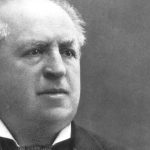
John does not proceed like Mark, who, after first mentioning the Baptist, suddenly introduces the Christ. Nor does John proceed like Luke, who takes as his point of departure the expectation that lived among the God-fearing Jews. And John proceeds unlike Matthew, who goes back to Abraham, and then from Abraham via David to Mary and then to the Christ. No, John does not speak about Abraham at all; he has John the Baptist going ahead of Christ as the ringing of the bells precedes the coming of the king, but he urges us to learn to understand Christ?s identity beyond the Baptist in Israel, and beyond Israel in the world, and beyond the world in terms of the ground of life, and beyond that ground of life of the world in the eternal Word, and thus all the way back to God?s being.
He begins, neither with the Baptist, nor with Abraham, nor even with the beginning of creation, but far beyond that beginning of things created: he begins in eternity, before the foundation of the world, and because there was nothing then but God, he takes his beginning in God himself.
John discloses to us a world of rich and glorious life within that eternal being of God, even when as yet no created world existed. This is the God expressing himself from eternity within himself, in his Word, or as stated in Proverbs 8:[25?26], 30, ?Before the mountains had been shaped, before ? the first of the dust of the world,? says the eternal Word, ?then I was beside him, like a master workman, and I was daily his delight, rejoicing before him always.? This is the portrayal full of majesty of the perfect life of love in God, even before a world existed to which his love could go out. For us this is a mystery, because we lack any capacity to conceptualize that divine household in the inner being of God, but it is a mystery that nevertheless really exists. A rich and glorious life did not come into being for God for the first time when the world came into being. Then God would have been from all eternity a dead or a slumbering God who did nothing. He would have been as though in need of the world, and that world would have made God?s life delightful for the first time. This is turning things upside down.
No, if we are to think of the life of our God with appropriate dignity, we must instead imagine that if this world had never come into being, there would have been from eternity nothing, absolutely nothing, except God and God alone. We must think that had he existed without creation, being eternally alone, our God would have been entirely satisfied and beatific within himself, in such a way that the creation of the world neither could nor did add anything to that beatific state.
We cannot understand this, of course, if we think of God as a rigid unity of persons, for how could one single person, eternally alone, enjoy a beatific state? But we do understand it if we confess more than nominally the holy triunity of our God. Then we do not see the personality of God as deficient and in need of help, but as three persons, so that God possesses within himself the full life of personality. And if we can then raise ourselves up to the point where if necessary we would give the whole world in order to gain Christ, and if we confess with Augustine, ?My heart remains restless in me till it finds rest in God,? then we understand how perfectly glorious and perfectly blessed that divine life within God himself must have been from all eternity, that holy interaction of God with God in the triunity of the persons.
Of this the holy apostle writes, ?In the beginning was the Word, and the Word was with God, and the Word was God. He was in the beginning with God? [John 1:1?2]. In three mighty strokes, therefore, he depicts the full blessedness of the divine Being, as a blessed, holy interaction of God with God in God himself, an interaction that transcends all understanding.
* * *
Adapted from Common Grace: God?s Gifts for a Fallen World: Volume 1 by Abraham Kuyper, translated by Nelson D. Kloosterman and Ed M. van der Maas, and edited by Jordan J. Ballor and Stephen J. Grabill. This volume is part of a major series of new translations of Abraham Kuyper?s key works in public theology, completed in partnership with the Kuyper translation society and the Acton Institute. Learn more.





